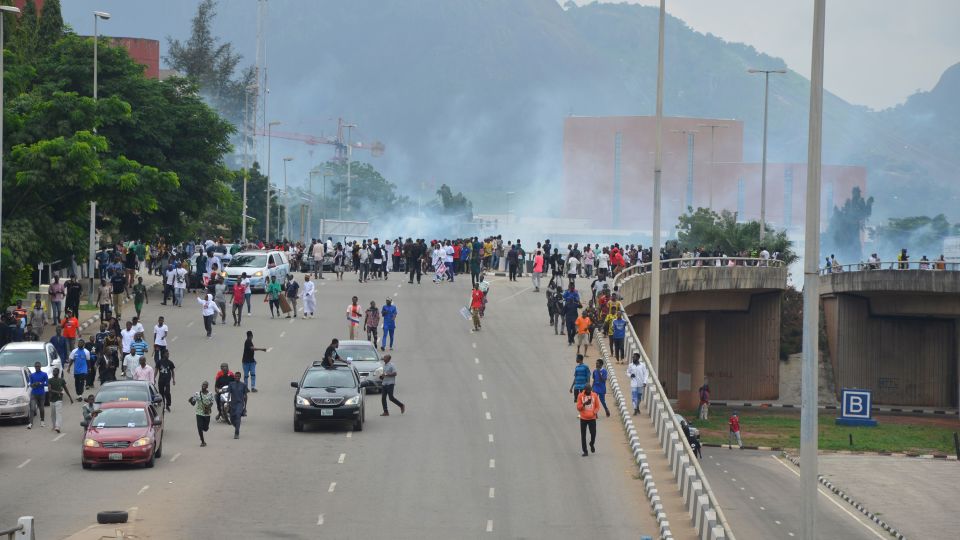In Nigeria, a concerning legal situation has emerged with the arraignment of twenty-nine children, ranging from ages 14 to 17, potentially facing the death penalty for participating in protests against the escalating cost-of-living crisis. On a recent Friday, these minors appeared in court, but four of them collapsed due to exhaustion prior to entering their pleas. The broader context of this case includes a total of 76 protesters facing charges that encompass treason, destruction of property, public disturbance, and mutiny. Such severe charges underscore growing frustration among the populace regarding the economic situation, which has incited several mass protests, including a fatal event in August where at least 20 individuals lost their lives demanding improved job opportunities for youth.
The introduction of the death sentence in Nigeria dates back to the 1970s. However, the nation has not executed anyone since 2016. Legal experts, such as Abuja-based lawyer Akintayo Balogun, argue that the country’s Child Rights Act precludes minors from undergoing criminal prosecution or facing capital punishment. Balogun asserted that bringing minors before a federal high court is inherently flawed unless the government can demonstrate that they are all over the age of 19. Making matters more dire, the court has set bail at 10 million naira (approximately $5,900) for each child, with stringent conditions that have not yet been satisfied. This situation raises serious questions about the treatment and protection of children in a time of national unrest.
Critically, the treatment of these children while in detention has come under fire. Some have been held without adequate food for an alarming period of 90 days, as noted by Marshal Abubakar, a lawyer representing several of the accused minors. The implications of prosecuting children in this manner have sparked outrage from civil society organizations, with Yemi Adamolekun, executive director of Enough is Enough, expressing her disapproval regarding the responsibilities of the authorities. Adamolekun emphasized that such punitive measures serve only to further undermine the country’s obligations toward its youth, particularly from the perspective of Nigeria’s chief justice, who she feels should take accountability for these proceedings.
Nigeria’s ongoing economic turmoil exacerbates the situation. Despite being one of Africa’s top crude oil producers, the country struggles with poverty and corruption that mar the lives of ordinary citizens. Public officials maintain a lifestyle disconnected from the realities faced by the general population, leading to widespread discontent. The frustration felt by the citizens is further amplified by strikes from medical professionals demanding fair wages and benefits, revealing a systemic issue that plagues essential services. Accusations of corruption against politicians remain rampant, while their pay remains some of the highest on the continent, highlighting the unequal distribution of resources in a country rich in natural wealth.
Moreover, Nigeria’s socioeconomic landscape is marked by high inflation rates and a struggling currency. With inflation at a 28-year high and the local naira depreciating against the dollar, many citizens are grappling with financial insecurity. The United Nations recently classified Nigeria as a “hotspot of very high concern,” indicating that a significant portion of the population is either currently experiencing or projected to face critical levels of food insecurity. As these disturbing headlines unfold, they reveal not only a national crisis but also an urgent call for political and social reforms aimed at improving the living conditions for Nigerians.
The plight of the detained minors speaks volumes about the larger challenges faced within Nigeria, suggesting a failure of the government to protect its most vulnerable citizens amidst societal unrest. As the country’s children bear the brunt of policies that neglect their rights and well-being, advocates for social justice and human rights emphasize the importance of safeguarding the futures of young people. The ongoing protests reflect a society demanding accountability from its leaders, greater investment in education and public welfare, and, ultimately, a more just legal system that prioritizes the protection of children’s rights. As the nation grapples with these pressing issues, the outcome of this case will likely resonate far beyond the courtroom, shaping the dialogue surrounding governance, justice, and the protection of youth in Nigeria for years to come.

